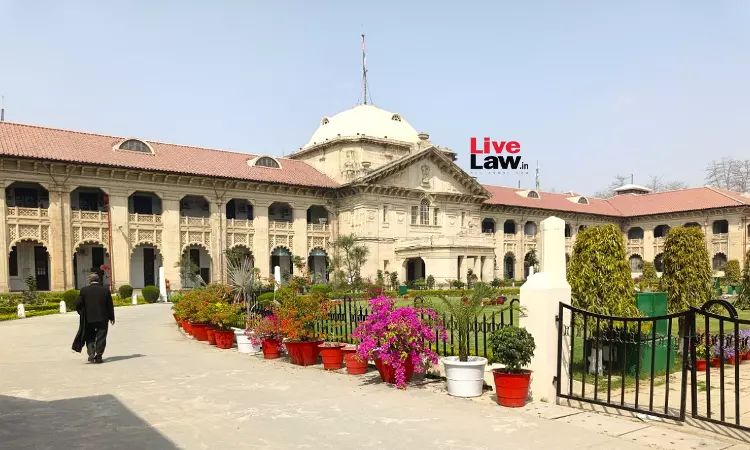- Home
- /
- High Courts
- /
- Allahabad High Court
- /
- Constitution Doesn't Back Forced...
Constitution Doesn't Back Forced Conversion; Presuming A Religion's Superiority Over Another Is Against Secularism: Allahabad HC
Sparsh Upadhyay
17 May 2025 2:31 PM IST
In a significant observation, the Allahabad High Court recently observed that the Constitution of India guarantees the right to 'freely' profess, practise, and propagate religion, and it doesn't endorse forced or fraudulent conversions. Stressing that the use of the word 'freely' in Article 25 of the Constitution of India underscores the voluntary nature of religious belief...
In a significant observation, the Allahabad High Court recently observed that the Constitution of India guarantees the right to 'freely' profess, practise, and propagate religion, and it doesn't endorse forced or fraudulent conversions.
Stressing that the use of the word 'freely' in Article 25 of the Constitution of India underscores the voluntary nature of religious belief and expression, a bench of Justice Vinod Diwakar said:
“Article 25(1) guarantees freedom of conscience and the right to freely profess, practise, and propagate religion. However, this right is expressly subject to public order, morality, and health, which provides a constitutional foundation for regulating religious conversions that are procured through coercion, misrepresentation, or undue influence. These limitations are essential in ensuring that the exercise of religious freedom does not disrupt the societal fabric or endanger individual and communal well-being” (emphasis supplied)
The Court made these remarks while dismissing an FIR quashing plea moved by 4 persons booked under the Uttar Pradesh Prohibition of Unlawful Religious Conversion Act, 2021.
As per the FIR, the accused were involved in persuading people to adopt Christianity by tempting them with money and free medical treatment.
While denying them relief, the Court noted that the allegations clearly constituted a cognizable offence against them, justifying the registration of the case and the investigation thereon.
Notably, in its 12-page order, the single judge observed that India's constitutional framework guarantees the right to religious freedom under Article 25 of the Constitution of India, however, it doesn't mean that it protects for coercive or deceptive practices under the guise of religious propagation.
On UP Govt's 2021 Act concerning Prohibition of Unlawful Conversion of Religion, the bench said that it has been enacted, aimed at maintaining public order, moral integrity, and health in alignment with Article 25 of the Constitution.
The Court added that the primary object of the Act is to prohibit conversions from one religion to another that are carried out through misrepresentation, force, undue influence, coercion, allurement, fraudulent means, or marriage for the sole purpose of unlawful conversion. “By targeting such methods, the law seeks to prevent exploitation and manipulation that could have broader destabilising effects on social harmony, besides disruption of law and order,” the bench noted.
Importantly, the Court also opined that the presumption that a particular religion is inherently superior to another goes against the idea of Indian secularism.
“The presumption that one religion is inherently superior to other clearly presupposes the moral and spiritual superiority of one religion over another. Such notion is fundamentally antithetical to the idea of secularism. Indian secularism is rooted in the principle of equal respect for all religions. The State neither identify with nor favour any religion, but instead must maintain a principled equidistant from all religions and faith,” the bench said.
The single judge also decided a core issued involved in the matter - whether the registration of impugned FIR by the SHO renders the entire criminal proceedings void ab initio in reference to the expression “any aggrieved person” employed in Section 4 of Uttar Pradesh Prohibition of Unlawful Religious Conversion Act, 2021.
In other words, the bench addressed the query as to whether the complainant/SHO was the aggrieved person, who could lodge an FIR, within the meaning of section 4 of Act, 2021, which only the victim, his/ her parent, brother, sister, or any other person who is related to him/her by birth, marriage or adoption.
The Court noted that Section 4 of the 2021 Act has to be read with Section 173 of the BNSS [Information in cognizable cases], so as to uphold the law's intent of preventing unlawful conversions.
The court added that, using purposive interpretation, the term “any aggrieved person” would include the SHO, who is empowered to maintain public order and register FIRs for cognizable offences.
In this regard, the Court stressed on duty of the State to prevent unlawful conversions by misrepresentation, coercion, or fraud to achieve the objective of the Act and thus, it held that a narrow interpretation of the expression “any aggrieved person” would make the 2021 Act 'otiose'.
Importantly, the Court also referred to Section 4 of the Amended Act, 2024, which expressly clarifies and permits “any person” to provide information about an offence under the 2021 Act.
“…(the amended Act) confirms the legislative intent to widen the scope of informants and further clarify procedural access. This substitution must be read as clarificatory in nature, consistent with the principle that procedural amendments apply to pending actions and supports a harmonious construction with sections 173 & 175 of BNSS, 2023. It thereby reinforces that the police, or any person aware of the commission of a cognizable offence under the Act, 2021 is empowered to initiate proceedings, thus ensuring that the statute is not rendered otiose” (emphasis supplied)
Thus, the Court held that “any person” aggrieved by the unlawful conversion in infringement of Article 25 of the Constitution of India, in accordance with the provisions 2021 Act, as amended by the 2024 Act, is entitled to file a complaint before the police to lodge an FIR to achieve its objectives.
With this, finding no substance in the quahsing plea, the bench dismissed the same.



